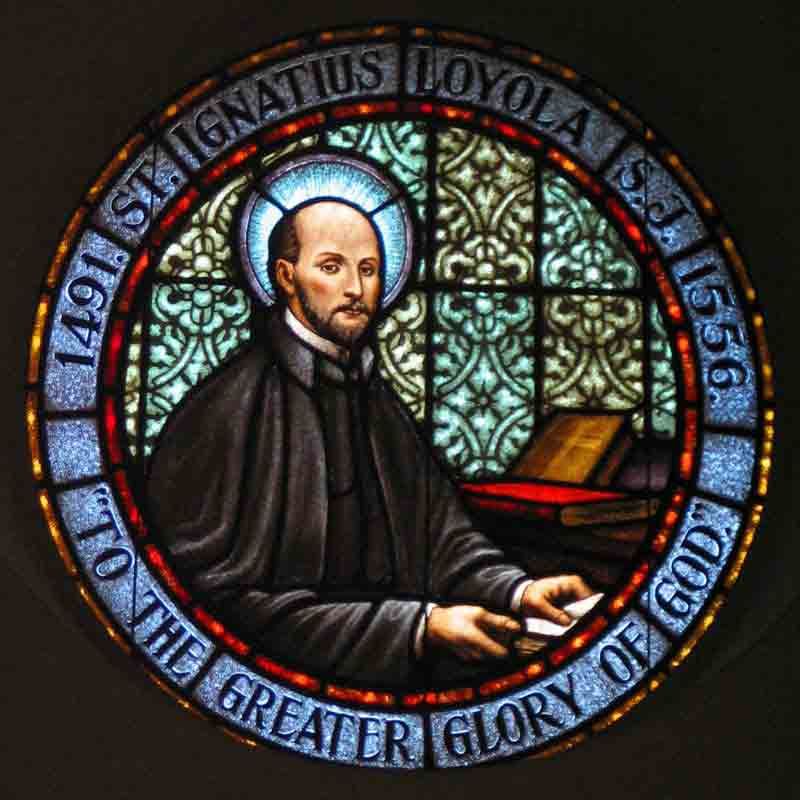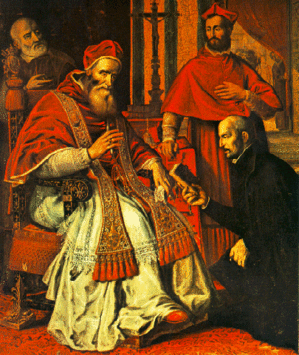Today, July 31, we celebrate the feast day of Saint Ignatius of Loyola (1491-1556), founder of the Society of Jesus (the Jesuit Order), and author of the “Spiritual Exercises”-- a manual for training the soul to grow nearer to God.
“The Exercises are the fountain of your spirituality and the matrix of your Constitutions, but they are also a gift that the Spirit of the Lord has made to the entire Church: it is for you to continue to make it a precious and efficacious instrument for spiritual growth of souls…..” --Pope Benedict XVI, February 2008
The Spiritual Exercises of St. Ignatius of Loyola are a month-long program of meditations, prayers, considerations, and contemplative practices that help Catholic faith become more fully alive in the everyday life of contemporary people. It is set out in a brief manual or handbook: sparse, taciturn, and practical. It presents a formulation of Ignatius' spirituality in a series of prayer exercises, thought experiments, and examinations of consciousness—designed to help a retreatant (usually with the aid of a spiritual director) to experience a deeper conversion into life with God in Christ, to allow our personal stories to be interpreted by being subsumed in a Story of God.
The Spiritual Exercises are divided into a series of four "stages”—with accompanying prayer, visualizations, reflections, and spiritual exercises for each week. These four movements include consideration of God's generosity and mercy and the complex reality of human sin; an imagining of the life and public ministry of Jesus, His proclamation of the Gospel, His sayings and parables, His teachings and His miracles; and of Jesus' last days, His arrest and interrogation, whipping, public mockery, Passion, crucifixion and death; and then, of Jesus’ Resurrection, His Ascension, and the pouring-forth of the Holy Spirit at Pentecost, and Christ’s continued life in the world through the Spirit today and in the Messianic People.
The four stages have been summed up as:
1. to reform what has been deformed by sin;
2. to make what is thus reformed conform to the Divine model, Jesus;
3. to strengthen what thus conforms'
4. to transform by love the already strengthened resolutions.
From the Spiritual Exercises of Ignatius Loyola
From the beginning of the Spiritual Exercises:
The First Principle and Foundation
The goal of our life is to live with God forever.
God who loves us, gave us life.
Our own response of love allows God's life to flow into
us without limit.
All the things in this world are gifts of God,
presented to us so that we can know God more easily
and make a return of love more readily.
As a result, we appreciate and use all of these gifts of God
insofar as they help us develop as loving persons.
But if any of these gifts become the center of our lives,
they displace God
and so hinder our growth toward our goal.
In everyday life, then, we must hold ourselves in balance
before all of these created gifts insofar as we have a choice
and are not bound by some obligation.
We should not fix our desires on health or sickness,
wealth or poverty, success or failure, a long life or short one.
For everything has the potential of calling forth in us
a deeper response to our life in God.
Our only desire and our one choice should be this:
I want and I choose what better
leads to the deepening of God's life in me.
From the end of the Spiritual Exercises:
Take, Lord, and Receive
Take, Lord, and receive all my liberty, my memory,
my understanding, and my entire will.
All I have and call my own.
Whatever I have or hold, you have given me.
I return it all to you and surrender it wholly
to be governed by your will.
Give me only your love and your grace
and I am rich enough and ask for nothing more.
To have the true sentiment which we ought to have in the Church… Let the following Rules be observed:
First Rule. The first: All judgment laid aside, we ought to have our mind ready and prompt to obey, in all, the true Spouse of Christ our Lord, which is our holy Mother the Church Hierarchical.
Second Rule. The second: To praise confession to a Priest, and the reception of the most Holy Sacrament of the Altar once in the year, and much more each month, and much better from week to week, with the conditions required and due.
Third Rule. The third: To praise the hearing of Mass often, likewise hymns, psalms, and long prayers, in the church and out of it; likewise the hours set at the time fixed for each Divine Office and for all prayer and all Canonical Hours.
Fourth Rule. The fourth: To praise much Religious Orders, virginity and continence, and not so much marriage as any of these.
Fifth Rule. The fifth: To praise vows of Religion, of obedience, of poverty, of chastity and of other perfections of supererogation. And it is to be noted that as the vow is about the things which approach to Evangelical perfection, a vow ought not to be made in the things which withdraw from it, such as to be a merchant, or to be married, etc.
Sixth Rule. To praise relics of the Saints, giving veneration to them and praying to the Saints; and to praise Stations, pilgrimages, Indulgences, pardons, Cruzadas, and candles lighted in the churches.
Seventh Rule. To praise Constitutions about fasts and abstinence, as of Lent, Ember Days, Vigils, Friday and Saturday; likewise penances, not only interior, but also exterior.
Eighth Rule. To praise the ornaments and the buildings of churches; likewise images, and to venerate them according to what they represent.
Ninth Rule. Finally, to praise all precepts of the Church, keeping the mind prompt to find reasons in their defense and in no manner against them.
Tenth Rule. We ought to be more prompt to find good and praise as well the Constitutions and recommendations as the ways of our Superiors. Because, although some are not or have not been such, to speak against them, whether preaching in public or discoursing before the common people, would rather give rise to fault-finding and scandal than profit; and so the people would be incensed against their Superiors, whether temporal or spiritual. So that, as it does harm to speak evil to the common people of Superiors in their absence, so it can make profit to speak of the evil ways to the persons themselves who can remedy them.
Eleventh Rule. To praise positive and scholastic learning. Because, as it is more proper to the Positive Doctors, as St. Jerome, St. Augustine and St. Gregory, etc., to move the heart to love and serve God our Lord in everything; so it is more proper to the Scholastics, as St. Thomas, St. Bonaventure, and to the Master of the Sentences, etc., to define or explain for our times the things necessary for eternal salvation; and to combat and explain better all errors and all fallacies. For the Scholastic Doctors, as they are more modern, not only help themselves with the true understanding of the Sacred Scripture and of the Positive and holy Doctors, but also, they being enlightened and clarified by the Divine virtue, help themselves by the Councils, Canons and Constitutions of our holy Mother the Church.
Twelfth Rule. We ought to be on our guard in making comparison of those of us who are alive to the blessed passed away, because error is committed not a little in this; that is to say, in saying, this one knows more than St. Augustine; he is another, or greater than, St. Francis; he is another St. Paul in goodness, holiness, etc.
Thirteenth Rule. To be right in everything, we ought always to hold that the white which I see, is black, if the Hierarchical Church so decides it, believing that between Christ our Lord, the Bridegroom, and the Church, His Bride, there is the same Spirit which governs and directs us for the salvation of our souls. Because by the same Spirit and our Lord Who gave the ten Commandments, our holy Mother the Church is directed and governed.
Fourteenth Rule. Although there is much truth in the assertion that no one can save himself without being predestined and without having faith and grace; we must be very cautious in the manner of speaking and communicating with others about all these things.
Fifteenth Rule. We ought not, by way of custom, to speak much of predestination; but if in some way and at some times one speaks, let him so speak that the common people may not come into any error, as sometimes happens, saying: Whether I have to be saved or condemned is already determined, and no other thing can now be, through my doing well or ill; and with this, growing lazy, they become negligent in the works which lead to the salvation and the spiritual profit of their souls.
Sixteenth Rule. In the same way, we must be on our guard that by talking much and with much insistence of faith, without any distinction and explanation, occasion be not given to the people to be lazy and slothful in works, whether before faith is formed in charity or after.
Seventeenth Rule. Likewise, we ought not to speak so much with insistence on grace that the poison of discarding liberty be engendered. So that of faith and grace one can speak as much as is possible with the Divine help for the greater praise of His Divine Majesty, but not in such way, nor in such manners, especially in our so dangerous times, that works and free will receive any harm, or be held for nothing.
Eighteenth Rule. Although serving God our Lord much out of pure love is to be esteemed above all; we ought to praise much the fear of His Divine Majesty, because not only filial fear is a thing pious and most holy, but even servile fear -- when the man reaches nothing else better or more useful -- helps much to get out of mortal sin. And when he is out, he easily comes to filial fear, which is all acceptable and grateful to God our Lord: as being at one with the Divine Love.











No comments:
Post a Comment
Thanks for leaving a comment. If you wish to submit a prayer request, however, please do so above, using the "Contact" tab.